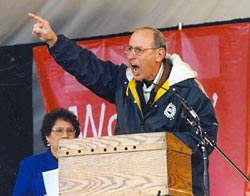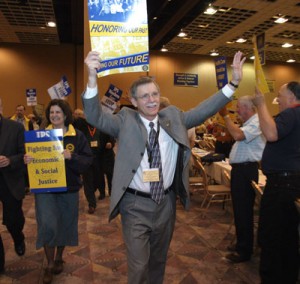
Yokich may have actually toyed with the idea of running for a third term himself.
Former UAW chieftain Steve Yokich was one “scary” guy, according to auto executives desperately seeking to evade responsibility for the meltdown of the U.S. auto industry. At the very least, Yokich’s ghost continues to haunt the United Auto Workers headquarters in Detroit, Solidarity House.
In fact, Yokich’s ghost apparently had a hand in scuttling any chance the UAW’s current president, Ron Gettelfinger, had of running for a third term. Gettelfinger has now disavowed any interest in a third term in a very public way by telling Paul W. Smith, the popular host of Detroit radio station WJR’s morning talk show, that he had no intention of extending his term or staying on as UAW president beyond June of 2010.
However, the arguments for keeping Gettelfinger, who will turn 65 in August, are actually substantial. He’s one of the few people with a comprehensive understanding of the complicated agreements the union has managed to negotiate over the past four years. He’s also managed to earn the respect of government representatives in Washington, auto executives in Detroit, and union members and retirees during what has arguable been the most difficult period in the UAW’s history, going all the way back to the bloody sit-down strikes of the 1930s that established it.

Smart, flexible, innovative and tough, Gettelfinger for eight years has kept the union moving forward.
The trial balloon floated either by Gettelfinger or someone acting on Gettelfinger’s behalf never went very far before being shot down by Yokich’s ghost or someone working on behalf of Yokich’s ghost.
The actual process by which the UAW presidency is filled is shrouded in secrecy. A candidate emerges from a secret caucus and is then elected by acclamation by delegates at the quadrennial constitutional convention. During the 1990s a potential merger with the United Steel Workers died because USW officials had suggested that the presidency of the merged union should be filled through a direct election in which every member had a vote.
The glue that holds the system together isn’t embedded in the UAW written constitution, though. There is no specific prohibition against an officer extending his tenure past age 65. Instead it’s part of union lore and custom.
One well placed UAW official explained this week that part of Gettelfinger’s problem — aside from the unhappiness among other UAW board members eager to replace him — is that in 2002 he stood by and let Yokich ruthlessly suppress a bid by a board member to overturn the caucus prohibition against running for office after age 65.
In virtually his last act as UAW president, Yokich, who may have actually toyed with the idea of running for a third term himself, scuttled the challenge by merging two of the union’s Ohio regions into one, eliminating the dissident’s seat at the board table. Gettelfinger, who was then preparing to take over as UAW president, never said a word. ” After that how could he run for another term?” noted someone who attended the 2002 convention.
In some ways, the flap over Gettelfinger’s third term has the makings of an amusing tale. However, with the Voluntary Employee Benefit Association trusts that will take over the administration of health care for members being modified to accept auto company stock instead of cash, the union could wind up owning a big chunk of the U.S. car business soon. And it has an executive selection process as secretive as any institution this side of the Vatican.
